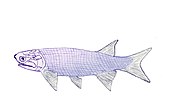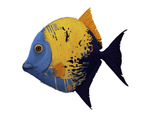Ctenognathichthys
| Ctenognathichthys Temporal range:
| |
|---|---|

| |
| Fossil from Monte San Giorgio | |
| Scientific classification | |
| Domain: | Eukaryota |
| Kingdom: | Animalia |
| Phylum: | Chordata |
| Class: | Actinopterygii |
| Order: | †Louwoichthyiformes |
| Family: | †Louwoichthyidae |
| Genus: | †Ctenognathichthys Bürgin, 1992 |
| Species: | †C. bellottii
|
| Binomial name | |
| †Ctenognathichthys bellottii (de Alessandri, 1910)
| |
| Synonyms | |
| |
Ctenognathichthys is an extinct genus of prehistoric marine ray-finned fish that lived during the Middle Triassic epoch of Europe, in the former Tethys Ocean.[1][2]
Taxonomy and occurrence
[edit]It contains a single species, C. bellottii from the Anisian–Ladinian-aged Besano Formation of Monte San Giorgio area (Swiss-Italian borderland),[3] the early Ladinian Prosanto Formation of canton Graubünden, Switzerland, and possibly the late Ladinian Alcover Unit of Spain.[2][4][5] Indeterminate remains are known from the middle Anisian of the Strelovec Formation of Slovenia.[6] A second species (C. hattichi Bürgin & Herzog 2002) from the Prosanto Formation was previously placed in this genus, but a 2009 study placed it in the new genus Luopingichthys alongside a species from China.[7]
Classification
[edit]Ctenognathichthys was first classified as a member of the family Perleididae and order Perleidiformes, a group that is now considered paraphyletic.[3] More recently, it has been reclassified into the family Louwoichthyidae (order Louwoichthyiformes).[8]
Description
[edit]
It was a small fish measuring 21 cm (8.3 in) in total length.[9] It had long prehensile teeth in its upper and lower jaws.[3]
See also
[edit]References
[edit]- ^ a b Sepkoski, Jack (2002). "A compendium of fossil marine animal genera". Bulletins of American Paleontology. 364: 560. Archived from the original on 2011-07-23. Retrieved 2009-02-27.
- ^ a b "PBDB Taxon". paleobiodb.org. Retrieved 2024-06-27.
- ^ a b c Bürgin, T. (1992). "Basal ray-finned fishes (Osteichthyes; Actinopterygii) from the Middle Triassic of Monte San Giorgio (Canton Tessin, Switzerland). Systematic palaeontology with notes on functional morphology and palaeoecology". Schweizerische Paläontologische Abhandlungen. 114: 1–164.
- ^ Bürgin, T.; Herzog, A. (2002). "Die Gattung Ctenognathichthys (Actinopterygii, Perleidformes) aus der Prosanto-Formation (Ladin, Mitteltrias) Graubündens (Schweiz), mit der Beschreibung einer neuen Art, C. hattichi sp. nov". Eclogae Geologicae Helvetiae. 95: 461–469.
- ^ Cartanyà, Joan; Fortuny, Josep; Bolet, Arnau; Garcia Artigas, Ruben (2019-05-24). "Moradebrichthys vilasecae gen. et sp. nov., a new perleidid (Actinopterygii: Osteichthyes) from the Middle Triassic of Catalonia (NE Iberian Peninsula)". Articles Publicats en Revistes (Mineralogia, Petrologia I Geologia Aplicada). 292 (2): 171–190. doi:10.1127/njgpa/2019/0816. hdl:2445/168813. ISSN 0077-7749.
- ^ Križnar, Matija; Tintori, Andrea. "The Kingdom of Tethys - The Fossilized World of Triassic Vertebrates from the Kamniško-Savinjske Alps / Kraljestvo Tetide - Okamneli svet triasnih vretenčarjev Kamniško-Savinjskih Alp". Scopolia - Suppl. 5 (Journal of the Slovenian Museum of Natural History).
- ^ Sun, Z.; Tintori, A.; Jiang, D.; Lombardo, C.; Rusconi, M.; Hao, W.; Sun, Y. (2009). "A New Perleidiform (Actinopterygii, Osteichthyes) from the Middle Anisian (Middle Triassic) of Yunnan, South China". Acta Geologica Sinica. 83 (3): 460–470. Bibcode:2009AcGlS..83..460S. doi:10.1111/j.1755-6724.2009.00067.x. S2CID 131017922.
- ^ Xu, G.-H. (2020). "A new stem-neopterygian fish from the Middle Triassic (Anisian) of Yunnan, China, with a reassessment of the relationships of early neopterygian clades". Zoological Journal of the Linnean Society. 191 (2): 375–394. doi:10.1093/zoolinnean/zlaa053.
- ^ Rieppel, O. (2019). Mesozoic Sea Dragons: Triassic Marine Life from the Ancient Tropical Lagoon of Monte San Giorgio. Indiana University Press. p. 54. doi:10.2307/j.ctvd58t86. ISBN 978-0253040114. S2CID 241534158.
- Prehistoric neopterygii
- Prehistoric ray-finned fish genera
- Middle Triassic fish
- Middle Triassic vertebrates of Europe
- Triassic fish of Europe
- Triassic Italy
- Triassic Switzerland
- Fossils of Italy
- Fossils of Switzerland
- Fossils of Slovenia
- Fossils of Spain
- Fossil taxa described in 1992
- Prehistoric ray-finned fish stubs
- Triassic fish stubs





